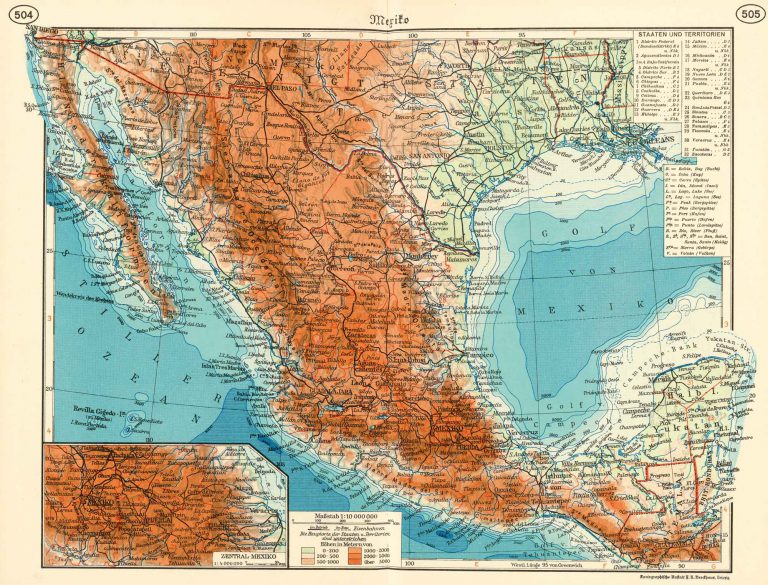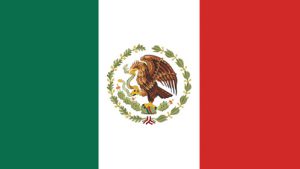
Mexico
Policy on Immigration and Refugees
After the Mexican Revolution (1910–20), which ended the authoritarian rule of Porfirio Díaz, Mexico sees itself as a worldly country and grants asylum to refugees, especially victims of political persecution in a difficult era. After years of political unrest, the revolutionary general Lázaro Cárdenas takes power in 1934 and seeks economic independence and industrial development for Mexico. This focus is also reflected in the country’s immigration policy, which is grounded in several fundamental principles: Immigrants should contribute to population growth, should bring expertise that will further the country’s development and, as many Mexican politicians advocate, should assimilate into Mexican society and not deviate too far from the population’s current cultural, ethnic, or sociopolitical composition. The Mexican immigration laws list fixed quotas for specific national immigrant groups beginning in 1937. For example, 5,000 immigrants from Germany are permitted per year.
In 1938, the Cárdenas administration nationalizes the country’s oil reserves, making enemies of energy companies, especially in the United States. Contributing to two neighbors’ conflict, the US fears that Mexico is harboring both Nazi spies and an increase in homegrown antisemitism. Partly to appease the United States, Cárdenas cooperates with the Roosevelt Administration and supports its plan for the Évian Conference. In fact, Mexico has accepted generous numbers of refugees from the Spanish Civil War after previously supporting the forces of the collapsed Spanish Republic. However, Mexico does not exempt Jewish refugees, who are prejudicially rumored to resist assimilation, from its quota policy. After the Évian Conference, Cárdenas increases the number of immigrants admitted, yet Jewish refugees are still not allowed in on tourist visas.
Nevertheless, Mexico becomes a destination for many Jews fleeing Europe. The Mexican Consul in France, Gilberto Bosques, issues thousands of visas to Jews, political opponents of Nazism, and supporters of the Spanish Republic in 1940 and 1941, and is therefore often called “Mexico’s Schindler.” The list of people who take refuge in Mexico includes many prominent names, among them Anna Seghers, Egon Erwin Kisch, and Hanns Eisler.
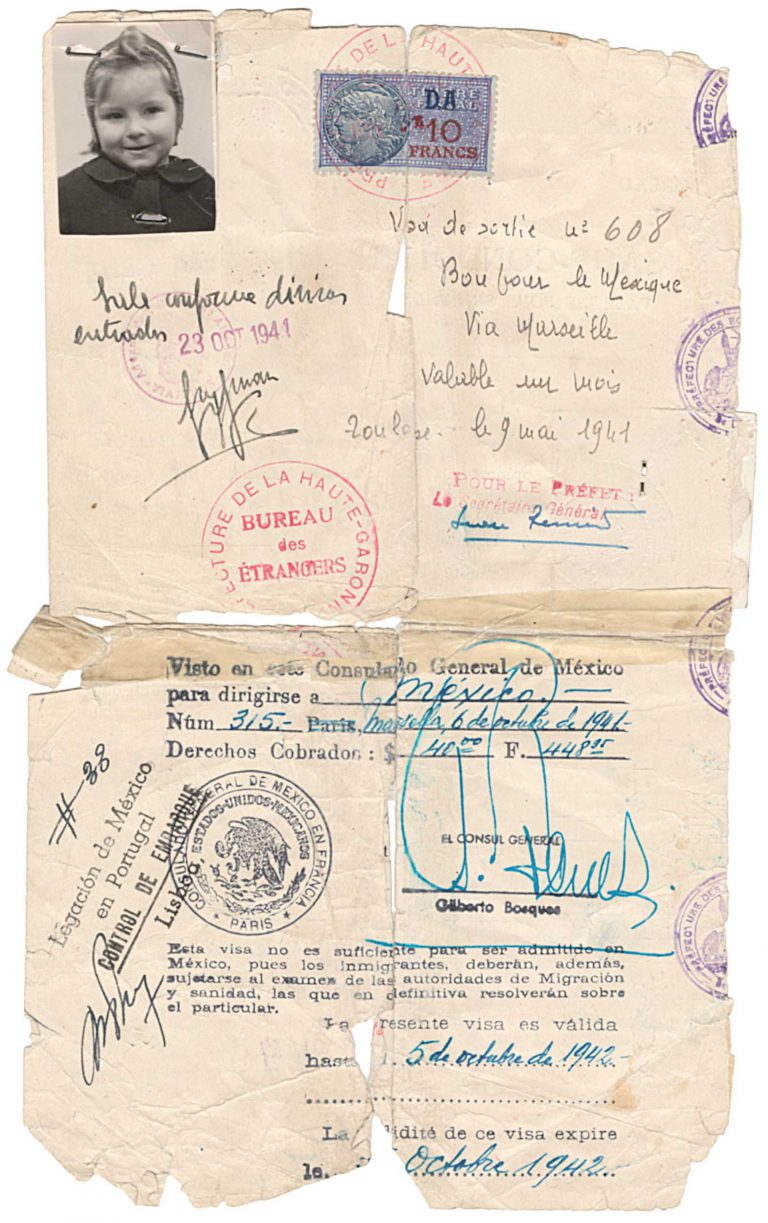
French exit visa and Mexican entry visa for Marie-Louise Abusch, May 9, 1941– October 5, 1942
Marie-Louise Abusch is the three-year-old daughter of the Communist editor Alexander Abusch, who has been in exile since 1933 in Paris, where his daughter was born in 1938.
Akademie der Künste, Berlin
French exit visa and Mexican entry visa for Marie-Louise Abusch, May 9, 1941– October 5, 1942
Marie-Louise Abusch is the three-year-old daughter of the Communist editor Alexander Abusch, who has been in exile since 1933 in Paris, where his daughter was born in 1938.
Akademie der Künste, Berlin
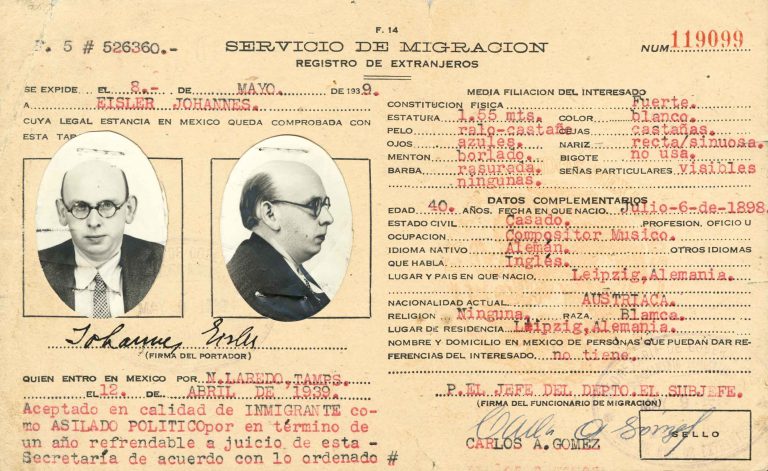
Limited one year Mexican residence permit for Hanns Eisler, March 31, 1939
As a Communist and the son of Jewish parents, the composer Hanns Eisler lives in exile in various countries beginning in 1933. In 1939, he receives a visa for Mexico as a victim of political persecution.
Akademie der Künste, Berlin
Limited one year Mexican residence permit for Hanns Eisler, March 31, 1939
As a Communist and the son of Jewish parents, the composer Hanns Eisler lives in exile in various countries beginning in 1933. In 1939, he receives a visa for Mexico as a victim of political persecution.
Akademie der Künste, Berlin
Delegation
Primo Villa Michel
* 7 November 1893 San Gabriel † 22 August 1970 Mexiko-Stadt
After working as a lawyer and a prosecutor, Primo Villa Michel enters politics. In 1927, he becomes governor of Mexico City and from 1932 to 1934 serves as the minister of industry under President Abelardo L. Rodríguez. Like the president, his successor Lázaro Cárdenas, and indeed every Mexican president from the years 1929 to 2000, Villa Michel is a member of the Institutional Revolutionary Party.
In addition to his political posts, Villa Michel embarks on a diplomatic career starting in the late 1920s and becomes the Mexican ambassador to Germany, followed by Austria, Uruguay, and Britain. In 1938, after the nationalization of Mexico’s oil reserves, he becomes the first director of the new national petroleum concern PEMEX.
After the Evian Conference, Villa Michel is first appointed as ambassador to Japan and becomes Mexico’s minister of the interior briefly from 1945 to ’46. He then returns to diplomacy and serves as ambassador to Canada, Guatemala, Syria, Luxembourg, and Belgium until 1964.
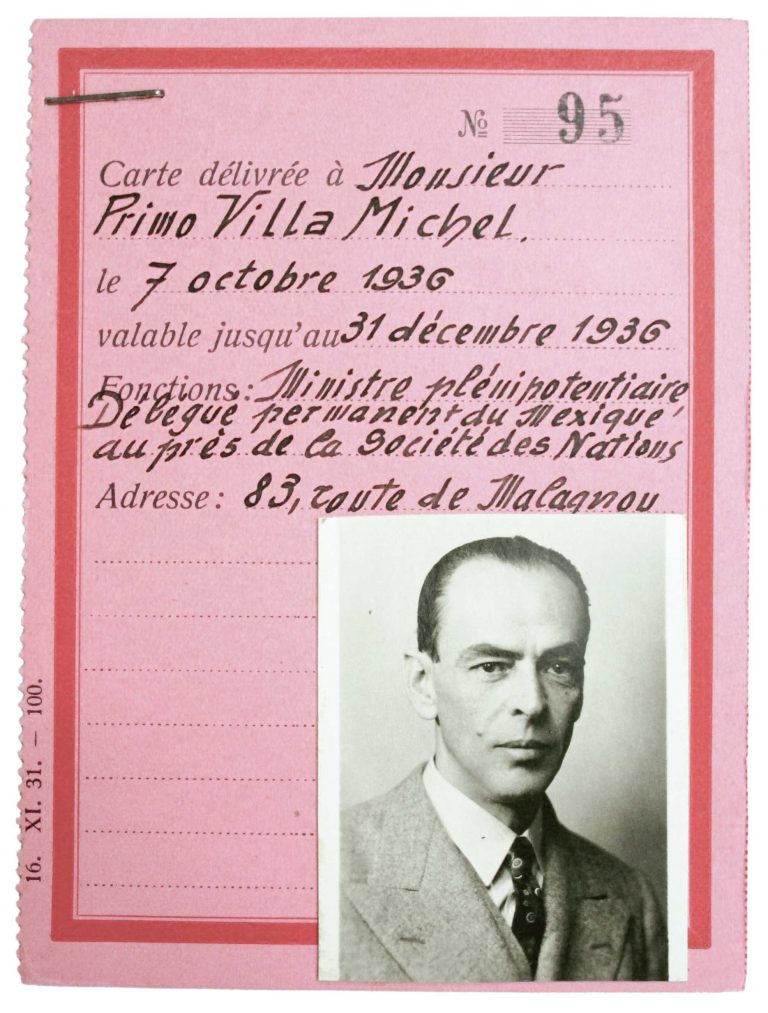
Primo Villa Michel, accreditation as Mexican delegate to the League of Nations in Geneva, ca. 1936
Schweizerisches Bundesarchiv, Bern, E2001C#10001535#B.56.5.7
Primo Villa Michel, accreditation as Mexican delegate to the League of Nations in Geneva, ca. 1936
Schweizerisches Bundesarchiv, Bern, E2001C#10001535#B.56.5.7
Manuel Tello Baurraud
* 1 November 1898 Zacatecas † 27 November 1971 Mexiko-Stadt
Manuel Tello Baurraud is a Mexican diplomat and foreign policy official. After studying law, he joins the Mexican foreign service and becomes a consul in Antwerp, Berlin, Hamburg, and Yokohama. Beginning in 1934, he works for the Mexican delegation to the League of Nations and becomes the country’s delegate from 1938 to 1941.
After the Évian Conference, Tello Baurraud embarks on a career in Mexico’s foreign policy. He holds the post of Mexico’s foreign minister on two occasions (1951–52 and 1958–64), interrupted by the equally influential post of ambassador to the United States (1952–58). Thus, Tello Baurraud plays a decisive role in Mexico’s foreign policy in the 1950s and 1960s and contributes to improving relations with the United States. As an experienced foreign policy maker, Tello Baurraud writes several books on international relations and geopolitics.
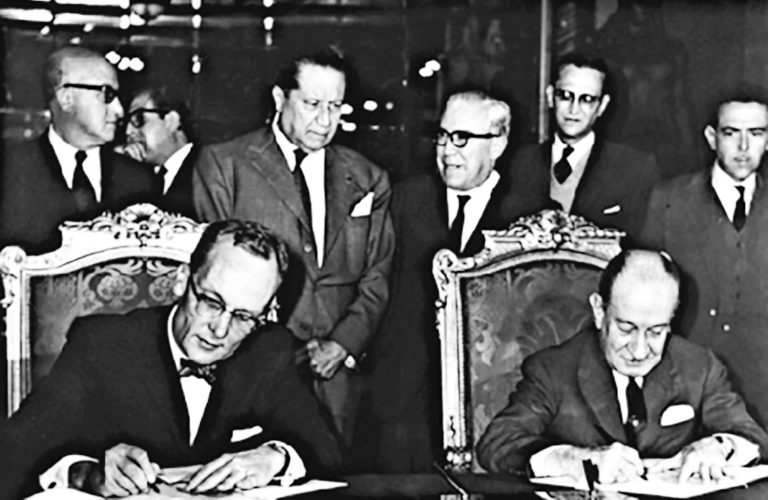
Manuel Tello Baurraud (right) signs the Convention of Chamizal in Mexico City as the Mexican foreign minister, August 29, 1963
The treaty ends a decades-long border conflict between Mexico and the United States.
National Park Service, US Department of the Interior, Washington DC / Wikimedia Commons
Manuel Tello Baurraud (right) signs the Convention of Chamizal in Mexico City as the Mexican foreign minister, August 29, 1963
The treaty ends a decades-long border conflict between Mexico and the United States.
National Park Service, US Department of the Interior, Washington DC / Wikimedia Commons
Conference Contributions
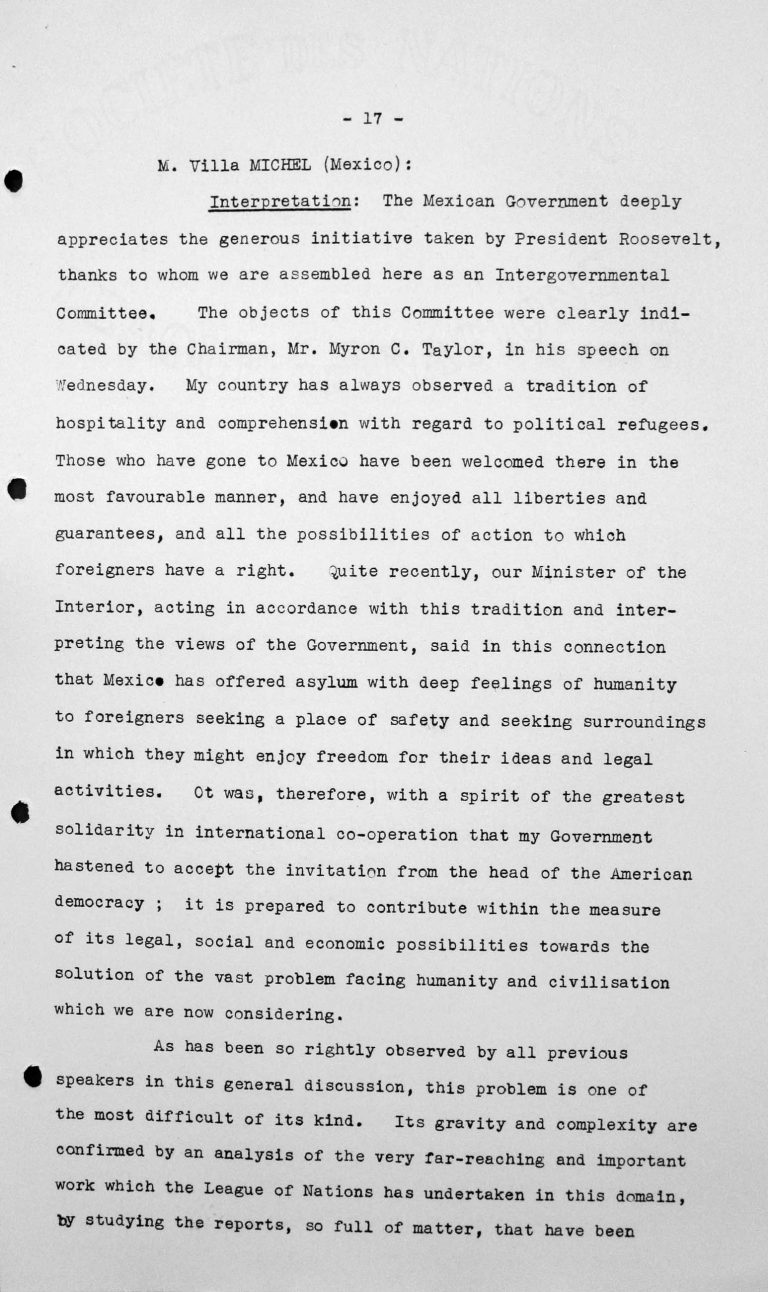
Speech by Primo Villa Michel (Mexico) in the public session on July 9, 1938, 11am, p. 1/4
Franklin D. Roosevelt Library, Hyde Park, NY
Speech by Primo Villa Michel (Mexico) in the public session on July 9, 1938, 11am, p. 1/4
Franklin D. Roosevelt Library, Hyde Park, NY
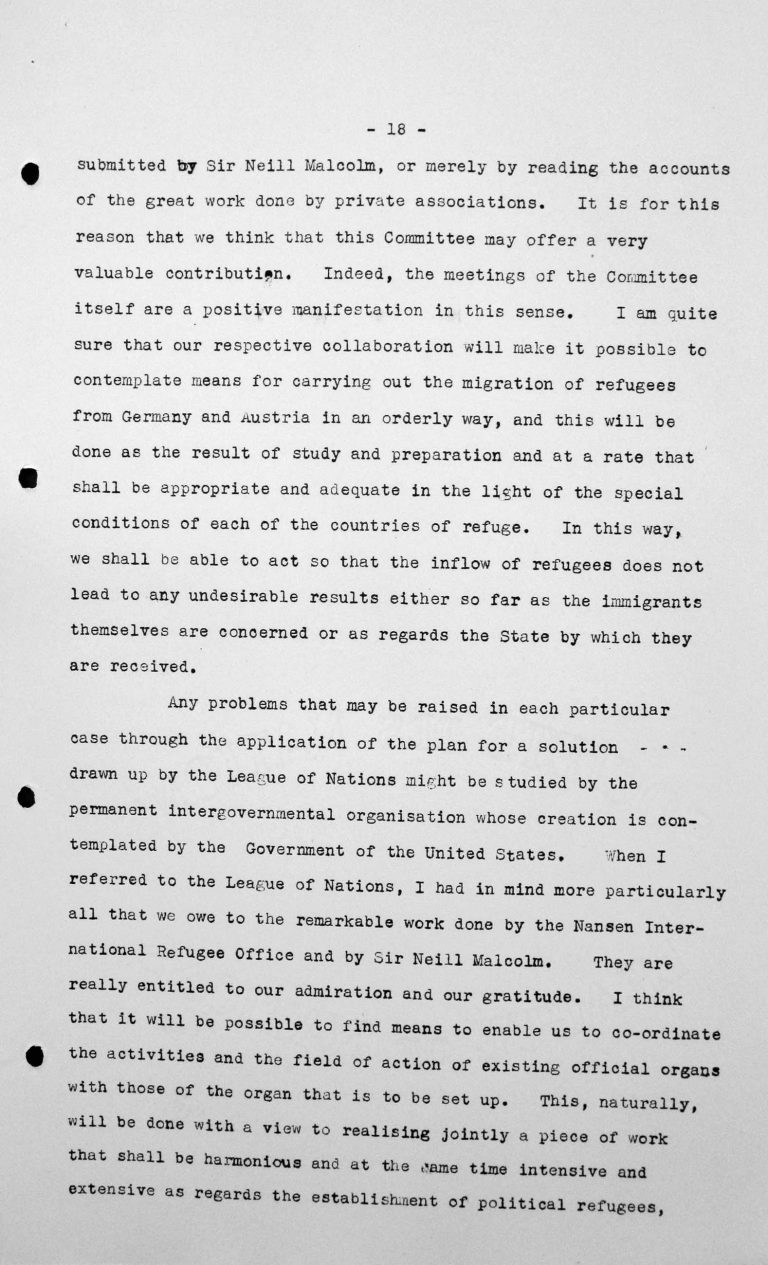
Speech by Primo Villa Michel (Mexico) in the public session on July 9, 1938, 11am, p. 2/4
Franklin D. Roosevelt Library, Hyde Park, NY
Speech by Primo Villa Michel (Mexico) in the public session on July 9, 1938, 11am, p. 2/4
Franklin D. Roosevelt Library, Hyde Park, NY
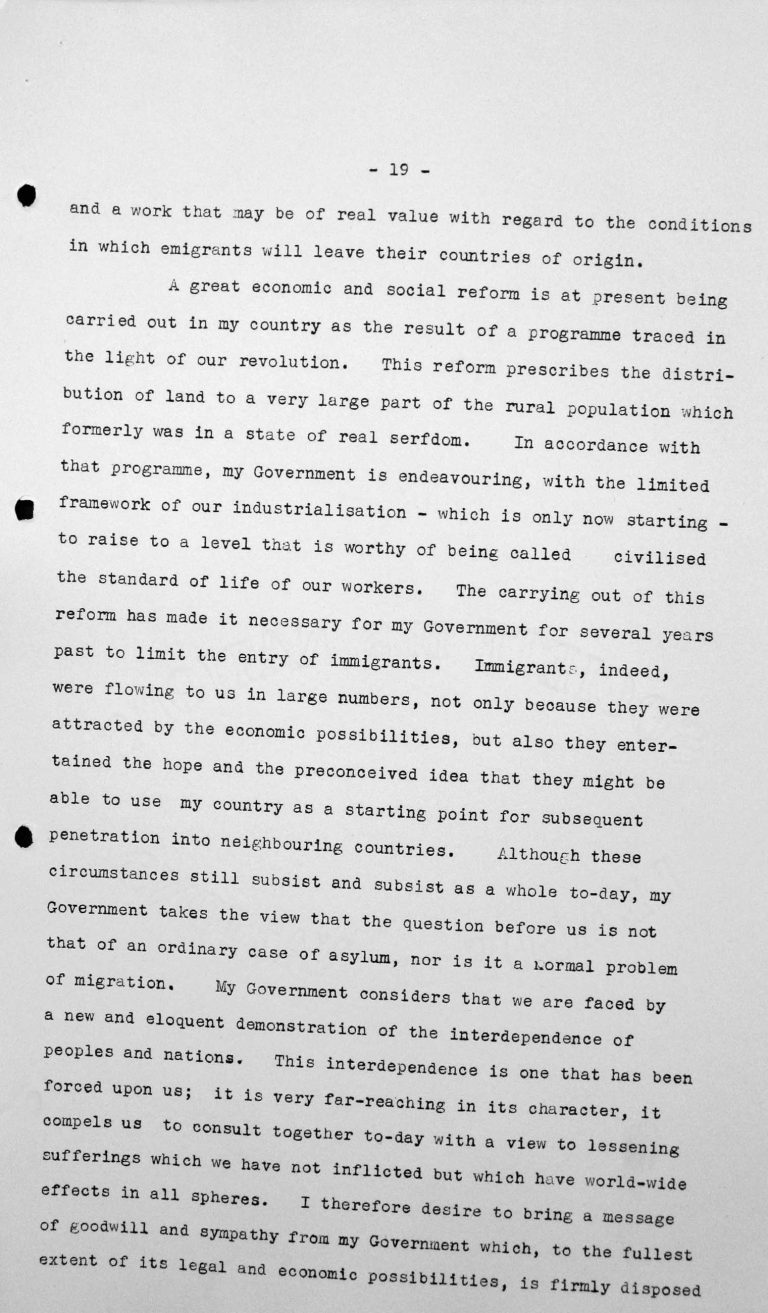
Speech by Primo Villa Michel (Mexico) in the public session on July 9, 1938, 11am, p. 3/4
Franklin D. Roosevelt Library, Hyde Park, NY
Speech by Primo Villa Michel (Mexico) in the public session on July 9, 1938, 11am, p. 3/4
Franklin D. Roosevelt Library, Hyde Park, NY
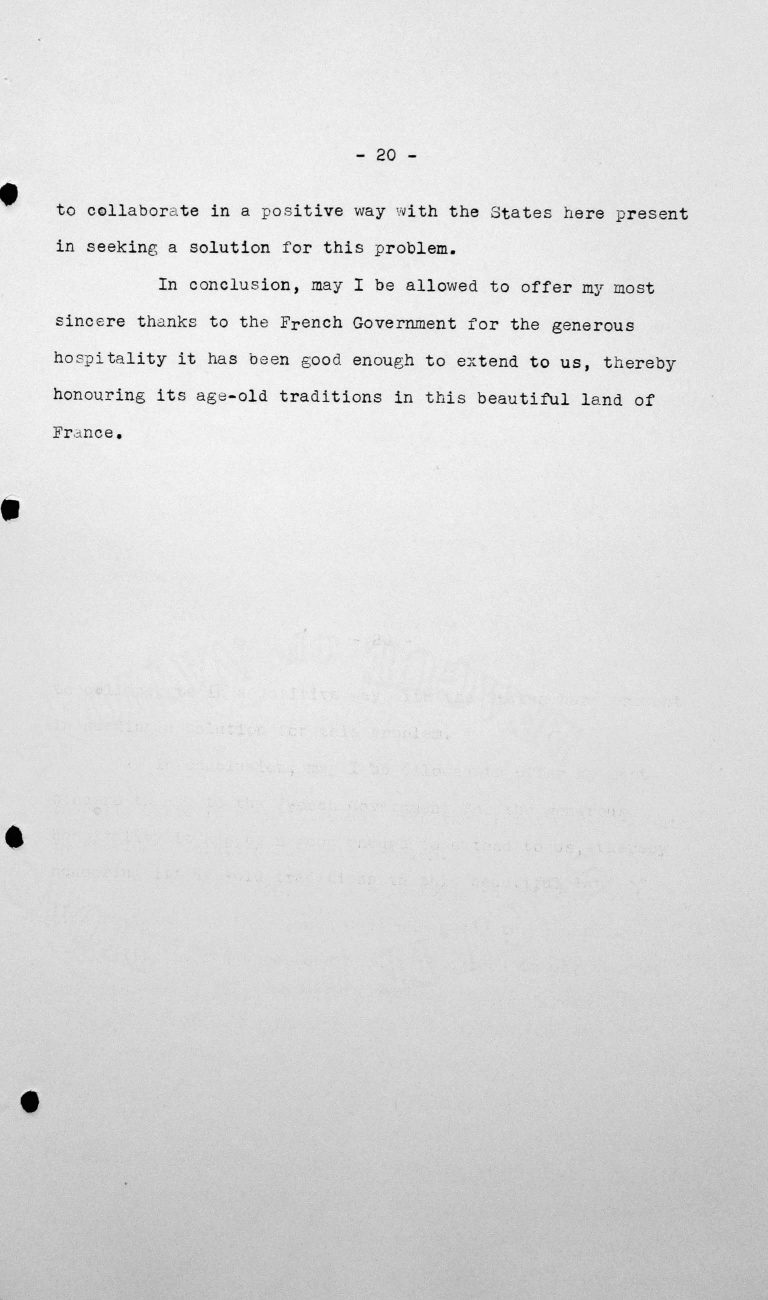
Speech by Primo Villa Michel (Mexico) in the public session on July 9, 1938, 11am, p. 4/4
Franklin D. Roosevelt Library, Hyde Park, NY
Speech by Primo Villa Michel (Mexico) in the public session on July 9, 1938, 11am, p. 4/4
Franklin D. Roosevelt Library, Hyde Park, NY
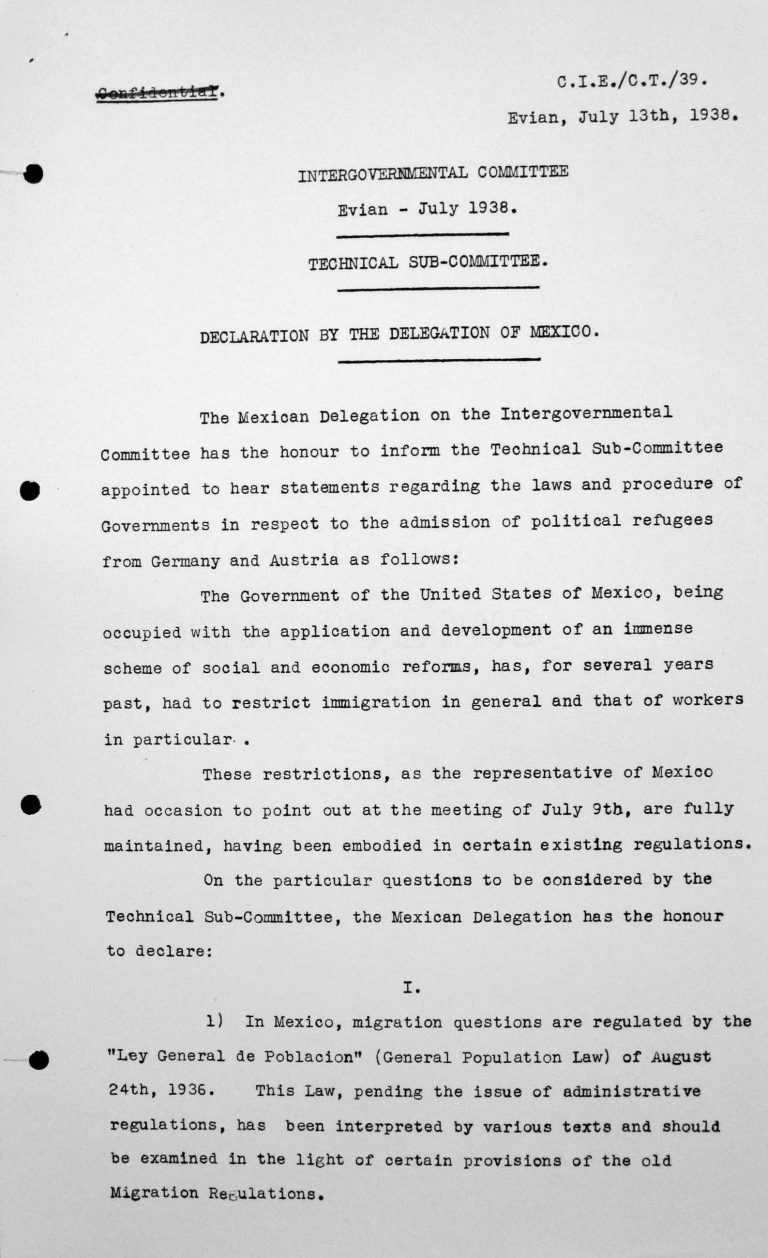
Declaration by the delegation of Mexico for the Technical Sub-Committee, July 13, 1938, p. 1/3
Franklin D. Roosevelt Library, Hyde Park, NY
Declaration by the delegation of Mexico for the Technical Sub-Committee, July 13, 1938, p. 1/3
Franklin D. Roosevelt Library, Hyde Park, NY
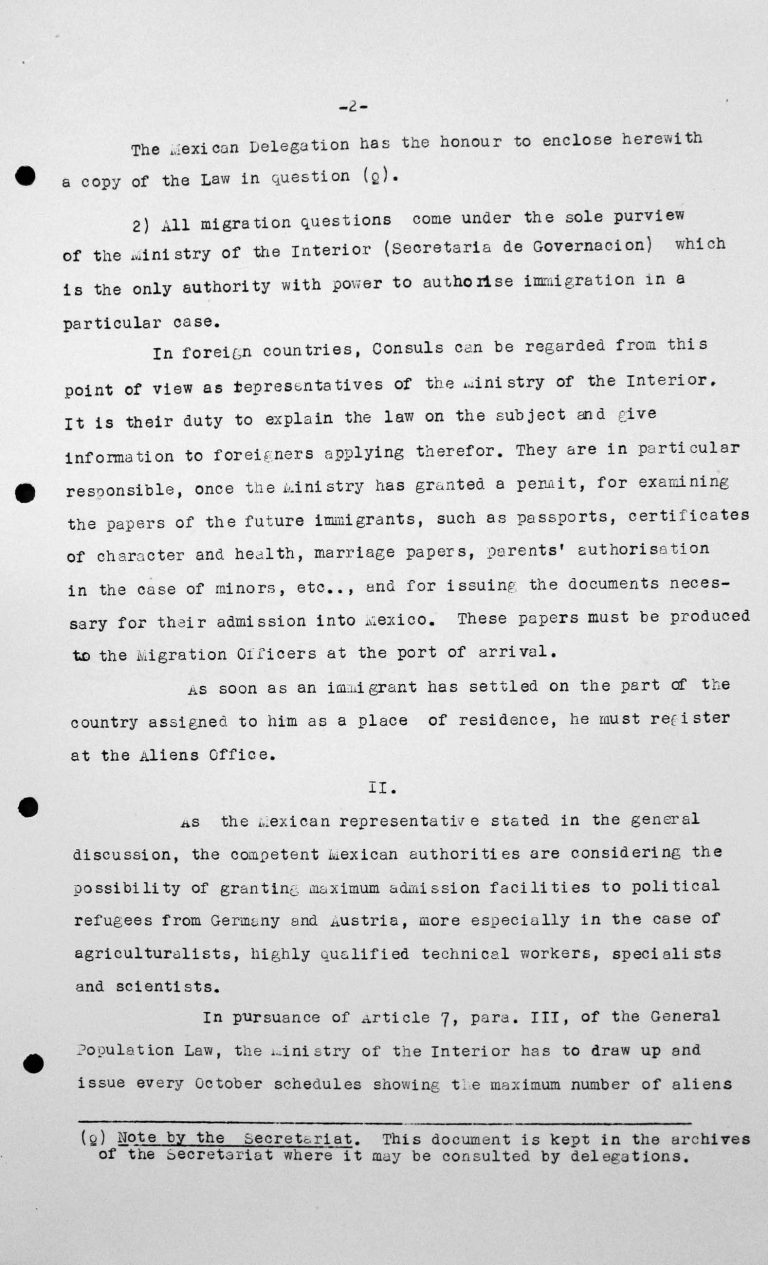
Declaration by the delegation of Mexico for the Technical Sub-Committee, July 13, 1938, p. 2/3
Franklin D. Roosevelt Library, Hyde Park, NY
Declaration by the delegation of Mexico for the Technical Sub-Committee, July 13, 1938, p. 2/3
Franklin D. Roosevelt Library, Hyde Park, NY
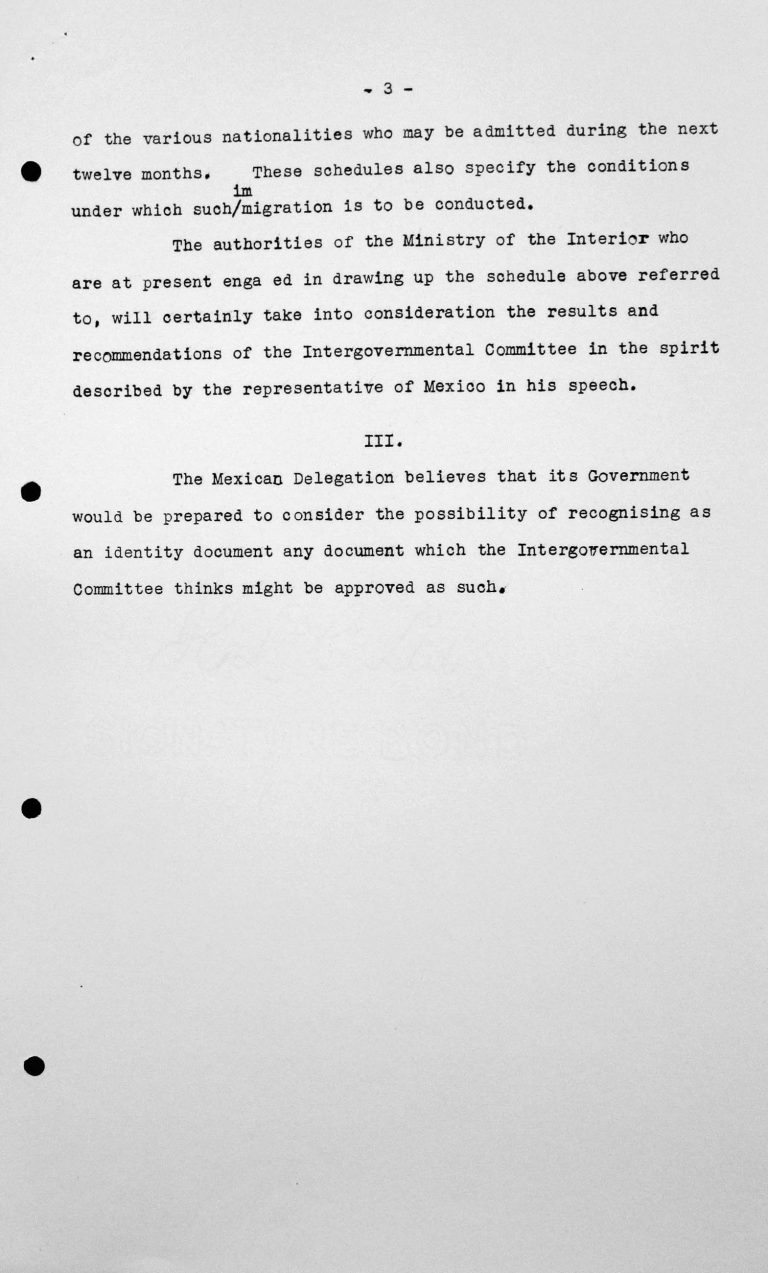
Declaration by the delegation of Mexico for the Technical Sub-Committee, July 13, 1938, p. 3/3
Franklin D. Roosevelt Library, Hyde Park, NY
Declaration by the delegation of Mexico for the Technical Sub-Committee, July 13, 1938, p. 3/3
Franklin D. Roosevelt Library, Hyde Park, NY
